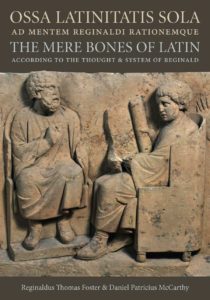Latin First Experience = Beginning Latin
Academic Term 2010-2020
and
Summer Term 17-28 August 2020
No knowledge of the language is presumed. The First Experience of the Latin language introduces the student to authentic Latin literature with a clear presentation of how human thought is expressed in Latin.
Encounter the living Latin language. Learn to pronounce and read Latin from original texts, both ancient and modern. Learn to compose your own sentences. Instruction given in English.
No vocabulary cards! No paradigms to memorize! Just the living language to understand, write and speak.
Working patiently, using simple texts for a clear understanding of what the author originally said. No rushing to impress others, just clear concise understanding.
We use the teaching method of Reginald Foster OCD directly from his book Ossa Latinitatis Sola.
Content: Beginning Latin is designed to introduce the beginning student with no previous knowledge of the Latin language to its following elements:
• the verb in all times of the indicative, both active and passive and deponent; • nouns and adjectives of all groups in five of their functions (subject; object; of-possession; by-with-from-in; to-for-from) • commands, active, passive, deponent; • personal and reflexive pronouns, conjunctions, relatives, prepositions.
We read together Latin texts from all ages and very many authors. Classes are held both weekly during the academic term and daily two weeks during the summer term (enrol and enquiries here).
Required books:
♦ SIMPSON, D.P. Cassell’s latin Dictionary, Macmillan, New York 1959 or equivalent, including a small English to Latin section. A pocket dictionary is not sufficient.
♦ FOSTER, R.T., – D.P. MCCARTHY, Ossa Latinitatis Sola ad mentem Reginaldi rationemque: The Mere Bones of Latin according to the thought and system of Reginald, (Latinitatis Corpus 1), Catholic University of America Press, Washington DC 2016. Available from the publisher or from Amazon.co.uk or from Amazon.com.
Recommended chapter: ♦ FOSTER, R.T. – D.P. MCCARTHY, “Collectarum latinitas”, Appreciating the Collect: An Irenic Methodology (DREI, AL : LA 1), ed. J.G. Leachman – D.P. McCarthy, St. Michael’s Abbey Press, Farnborough, England 2008.Foster, R.T. – D.P. McCarthy, “Collectarum latinitas”, 27-56. This chapter presents a brief schema of many elements presented in this intermediate Latin experience and their application to the prayers of the Missale Romanum.Available from the publisher.
Academic Term 2019-2020
Sessions: We offer weekly sessions in beginning, intermediate and advanced Latin. The sessions are held at the Benedictine Institute, 74 Castlebar Road, Ealing, London W5 2DD.
Tutor: Daniel Vowles
Information: More information is available on the web-site of the Benedictine Institute here.
Enrol: Enquire and Enrol by contacting the Registrar by e-mail at il AT liturgyinstitute DOT org or by phone or post available here.
Summer Term, 2020
Like all of the courses in the Summer Latin School, the introductory course is offered for enjoyment, not for credit. It will be done entirely online. This First Experience of the Latin language will offer authentic Latin literature – authors such as Virgil, Horace, Plautus and Cicero from the very first day – with a clear presentation of how human thought is expressed in Latin. No prior knowledge of Latin is presumed, though the First Experience will also be useful to those whose Latin is rusty or who would like to encounter the teaching method developed over many years by Reginald Foster. No paradigms to memorize – just the living language to understand, write and speak. Online in time of Covid-19 The Summer 2020 program will be conducted online, in a way highly adapted to each student: individual tutoring, small groups, or larger group sessions. We will work as quickly or slowly as people prefer. Ideally, we will cover all of the content of the First Experience from Ossa Latinitatis Sola; students will benefit from having a copy of this text, but the course can be done without it. Participants will need a good Latin dictionary, such as Cassell’s.
We read together Latin texts from all ages and very many authors, including texts suitable for people studying Canon Law at KU Leuven.
Sessions. Four hours and forty-five minutes of instruction daily.
Or enrol for both weeks: 17 – 28 August 2020 (not Saturday – Sunday, 22 – 23 August).Hours. Two sessions are held every morning and two sessions after lunch daily: 09:30-12:30 with a break 2:00-4:15 with a break Activities include the presentation of Latin and reading Latin texts together and a daily ludus domesticus, “home-game”, for self-study and in class review. Tutor: Jonathan Day

This course is not offered for credit, so there is no exam, just the enjoyment of learning the Latin language.
Canon Law Students at KU Leuven are encouraged to take Beginning Latin before commencing their studies at Leuven. During the next summer they may take the Intermediate Latin, which will prepare them to take the sufficiency exam for Christian Latin (A08A0A), which covers about the first 25 chapters of Collin’s Primer of Ecclesiastical Latin, including some usages of the subjunctive and some usages of the four participles, which we present in our intermediate course. During their third summer they may take both Proficient Latin for Liturgists, which also considers canonical texts regarding liturgy, along with Readings Cicero’s Letters, both of which will prepare them for the advanced Latin exam at KU Leuven. They are also welcome to begin their study of Latin later in their programme of study at KU Leuven.
Students for personal interest may not feel the same pressure to complete the daily ludus domesticus (homework), but are invited to attend the sessions when these are reviewed. There are no exams, just the enjoyment of learning Latin.Enrol: Enquire and Enrol by contacting the Registrar, Clare Cogswell, by e-mail at il AT liturgyinstitute DOT org or by phone or post at the address given below or here.
Contact:
To schedule a visit write to the Registrar and Course Coordinator:
Clare Cogswell Benedictine Institute 74 Castlebar Road, Ealing, London W5 2DD, UK
enquiries: ++44 (0)20 8194 2320
E-mail: il AT liturgyinstitute DOT org
Location on Google Maps is found here.
More information on travel to Ealing by air, train or metro and on accommodation at or near Ealing Abbey is available on this web-site under the button: “Registration”.
Page updated 7 June 2020 by DMcC.
